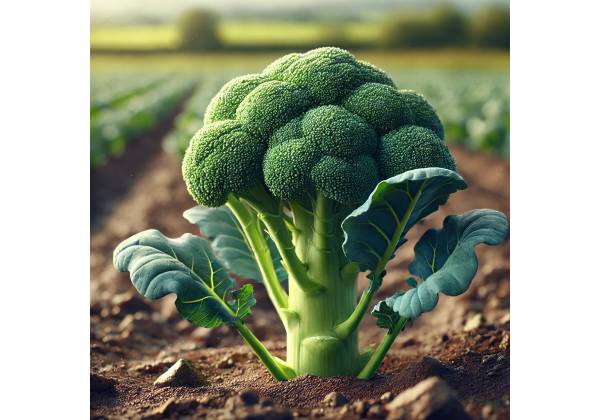
Broccoli is a familiar vegetable with an unusually “medicinal” nutrient profile: it delivers fiber, vitamin C, folate, potassium, and vitamin K, alongside sulfur-containing plant chemicals that are rare in most other foods. As a member of the crucifer family, broccoli is valued less for a single vitamin and more for how its compounds work together—supporting antioxidant defenses, everyday detoxification enzymes, and healthy inflammatory balance.
What makes broccoli especially interesting is that its benefits depend on how you prepare it. When broccoli is chopped or chewed, an enzyme activates and helps convert glucosinolates into bioactive compounds such as sulforaphane. That conversion is one reason broccoli sprouts and lightly cooked broccoli are so often discussed in wellness circles. At the same time, broccoli is not “magic,” and it is not perfect for everyone: its fiber and sulfur compounds can irritate sensitive digestion, and its vitamin K content matters for people on certain blood thinners.
This guide explains what is in broccoli, what it may realistically help with, how to use and cook it well, how much to eat, and how to stay safe.
Top Highlights
- Regular intake can support antioxidant enzyme activity and healthy inflammatory balance.
- A practical food range is 90–180 g per day (about 1–2 cups cooked or 1–2 cups raw florets).
- Overcooking reduces formation of some beneficial compounds, but lightly cooked broccoli still offers strong nutrition.
- People on warfarin should keep broccoli intake consistent rather than avoiding it.
- Those with severe IBS symptoms, thyroid disease with iodine deficiency, or kidney disease on mineral restrictions should use extra caution.
Table of Contents
- What is in broccoli
- Broccoli health benefits overview
- How to use broccoli daily
- How much broccoli per day
- How to cook broccoli well
- Side effects and interactions
- What the evidence actually says
What is in broccoli
Broccoli is the edible flowering head and upper stem of Brassica oleracea var. italica. Nutritionally, it is a low-calorie, high-volume food that combines micronutrients with fiber and a distinctive group of sulfur-rich plant chemicals. If you are building a diet for long-term health, broccoli’s value is not only what it adds, but what it can replace: it makes meals more filling and nutrient-dense without relying on refined starches or added sugars.
Core nutrients you get in a typical serving
A practical serving (around 1 cup cooked or a generous handful of raw florets) contributes:
- Fiber for satiety and bowel regularity
- Vitamin C for immune and collagen support
- Folate for cell division and cardiovascular health
- Potassium for fluid balance and blood pressure support
- Vitamin K for normal blood clotting and bone metabolism
- Carotenoids (including lutein and beta-carotene) that support eye and skin health
Because broccoli is mostly water and fiber, it pairs well with protein and healthy fats. For example, broccoli with olive oil, eggs, tofu, fish, or beans tends to feel more satisfying than broccoli alone, and the added fats can improve absorption of fat-soluble nutrients.
Glucosinolates, myrosinase, and why preparation matters
The signature “medicinal” aspect of broccoli is its glucosinolate content (notably glucoraphanin). Glucosinolates are not fully active on their own. They become more biologically interesting when converted into isothiocyanates such as sulforaphane. That conversion depends on an enzyme called myrosinase, which is activated when broccoli is:
- chopped, crushed, or blended
- chewed thoroughly
- lightly cooked (rather than aggressively boiled for long periods)
Think of it as a two-part system: broccoli stores the precursor, and handling the vegetable helps it transform into more bioactive compounds. This is why raw broccoli, broccoli sprouts, and lightly cooked broccoli are often emphasized.
If you want a deeper look at the compound most associated with broccoli’s “detox” reputation, see sulforaphane mechanisms and practical benefits for a focused explanation of how it is studied and where expectations should stay realistic.
Fresh, frozen, and sprouts
Fresh broccoli is excellent, but frozen broccoli can be just as useful for daily habits. Frozen options are often processed quickly, and they simplify consistency. Sprouts are a different category: they are concentrated in certain glucosinolates, but they also require careful food safety handling, which matters for people with higher infection risk.
Broccoli health benefits overview
Broccoli’s health benefits are best understood as a combination of “basic nutrition” and “signal-supporting compounds.” The basic nutrition—fiber, vitamins, and minerals—supports digestion, immune function, and metabolic stability. The signaling compounds—especially isothiocyanates formed from glucosinolates—are studied for how they influence antioxidant defense, inflammation, and detoxification enzymes. In other words, broccoli is not only a source of nutrients; it may also influence how the body responds to everyday stressors.
Antioxidant defenses and cellular resilience
Many people hear “antioxidants” and imagine broccoli directly neutralizing free radicals in the bloodstream. The more useful framing is that broccoli compounds may help the body turn on its own protective systems. Sulforaphane is often discussed because it can influence pathways that regulate detoxification enzymes and antioxidant proteins. This is one reason broccoli is sometimes described as supporting “cellular housekeeping.” You do not need to chase high doses to benefit; regular food portions can support a steady background of protective nutrition.
Heart health and blood pressure support
Broccoli fits heart-supportive eating patterns in several ways:
- Its fiber helps with fullness and can support healthier cholesterol patterns when it replaces refined snacks.
- Its potassium supports healthy blood pressure regulation.
- Its low energy density helps with weight maintenance, which indirectly benefits cardiovascular risk.
- Its plant chemicals are studied for inflammation and endothelial signaling, though effects vary by person and by overall diet quality.
In practice, broccoli’s biggest heart benefit often comes from substitution: a plate built around vegetables and protein tends to displace more ultra-processed foods over time.
Metabolic support and glucose steadiness
Broccoli is carbohydrate-light and fiber-forward, which makes it useful for people aiming for steadier post-meal energy. When you add broccoli to a starch-heavy meal, you often reduce the speed and total “load” of digestion. That may translate into more stable hunger cues and less snacking later.
If you want the most realistic, repeatable metabolic benefit, focus on meal structure: broccoli plus protein plus a healthy fat source is far more effective than broccoli added as an afterthought.
Immune support and gut-skin connections
Broccoli’s vitamin C and phytochemicals can support normal immune function, but it is not a “cold cure.” The more dependable benefit is nutritional: consistent micronutrient intake supports immune readiness, while fiber supports a gut environment that influences immune signaling. People sometimes notice secondary benefits—such as better skin clarity or less bloating—when broccoli replaces more processed foods and overall fiber intake improves.
How to use broccoli daily
Using broccoli consistently is easier when you treat it as a flexible ingredient rather than a “health assignment.” Broccoli works across cuisines and meal types, and the best approach is the one that fits your schedule and digestion. Some people do well with raw broccoli; others feel better with lightly cooked broccoli that is easier to digest. Both can be valuable.
Common forms and what they are best for
- Raw florets: Crunchy, quick, and convenient for salads and snack plates. If raw broccoli causes bloating, try smaller portions or choose lightly cooked instead.
- Steamed or sautéed florets: Often the best balance of digestibility and nutrient retention.
- Roasted broccoli: Great flavor and texture. Roasting can still be “light cooking” if you avoid prolonged high heat.
- Frozen broccoli: A reliability tool. It reduces waste and makes it easier to eat broccoli several times per week.
- Broccoli sprouts: Concentrated in certain precursors to sulforaphane. They can be used in salads, wraps, and bowls, but they require stronger attention to hygiene and safe storage.
Practical ways to build broccoli into meals
If your goal is to eat broccoli more often, reduce the friction:
- Add broccoli to a sheet-pan meal with chicken, tofu, or beans and a drizzle of olive oil.
- Stir broccoli into omelets, frittatas, and egg scrambles.
- Use chopped broccoli stems in soups and blended vegetable sauces.
- Make broccoli the “base” under a protein, then add a sauce you genuinely enjoy (garlic, lemon, tahini, yogurt-based sauces, or spice blends).
A useful habit is to keep broccoli flavor-friendly rather than “pure.” If you enjoy it more, you will eat it more.
Sprouts and powders: when they make sense
Sprouts can be appealing for people who want a smaller volume with a stronger “broccoli compound” profile. The tradeoff is that sprouts can carry a higher food safety risk than mature vegetables if they are handled poorly. Powders and extracts also exist, but they vary widely in quality and dosage. For most people, food-first broccoli is the safest, most predictable strategy.
One simple technique to support sulforaphane formation in cooked broccoli is adding a small amount of mustard or mustard powder, because mustard can provide active enzymes that help with conversion. If you want ideas for using mustard as a functional ingredient rather than a condiment, see mustard uses and health properties for practical, food-based approaches.
How much broccoli per day
There is no single perfect dose of broccoli, but there are practical ranges that work for most people. The right amount depends on your digestion, your overall vegetable intake, and whether you are using broccoli as a “cornerstone vegetable” or as one of several rotating options. For long-term health, variety still matters—broccoli is powerful, but it should not be your only vegetable.
A practical daily range for whole broccoli
For most adults, a useful food-based range is:
- 90–180 g per day, roughly 1–2 cups cooked or 1–2 cups raw florets
This amount is enough to meaningfully contribute fiber and micronutrients while staying reasonable for digestion. If you are new to higher-fiber eating, start closer to 1 cup and build up over one to two weeks.
A common weekly goal is even more approachable: 3–5 servings per week. Many people do better with a weekly target because it allows variety without the pressure of daily repetition.
Broccoli sprouts: smaller volume, stronger punch
Broccoli sprouts are often used in smaller portions, such as:
- 15–30 g per day (roughly a small handful)
If you use sprouts, treat them as a “special ingredient” you rotate rather than a daily requirement. Store them cold, use clean utensils, and discard them if they smell off or become slimy.
Supplements and extracts: cautious dosing logic
Broccoli seed extracts and sprout extracts are usually standardized to either glucoraphanin or sulforaphane yield. Because products differ, label directions vary widely. A cautious approach is to avoid stacking multiple products and to treat supplements as “optional,” not essential.
If you do choose a supplement, consider these dose principles:
- Prefer products that clearly state standardization (what compound and how much).
- Start at the lowest labeled dose for 1–2 weeks.
- Stop if you notice persistent GI upset, headaches, or unusual symptoms.
- Avoid combining with other “detox blends” that may add unnecessary stress on digestion.
For people who struggle with fiber-related bloating, it can help to learn basic troubleshooting—hydration, gradual increases, and dose timing. The strategies outlined in psyllium fiber guidance for digestion translate well to broccoli: go slowly, build consistency, and let your gut adapt.
How to cook broccoli well
Cooking broccoli well is not only about taste; it can influence digestibility and the formation of certain beneficial compounds. The goal is to keep broccoli bright and tender-crisp rather than gray and mushy. From a health perspective, “light cooking” often gives the best balance: it preserves many vitamins, improves digestion for many people, and can still support conversion of key plant compounds when you prepare it thoughtfully.
Best everyday methods
These options are reliable for both nutrition and flavor:
- Steaming (short): Often the simplest method. Steam until bright green and just tender.
- Quick sauté or stir-fry: Works well when you cut broccoli into smaller florets and cook briefly.
- Roasting: Roast until edges are browned but stems are still firm. Add olive oil and salt for palatability.
- Microwaving with minimal water: A practical option that can be gentle and quick when you avoid long cook times.
A simple “prep sequence” that supports bioactive compounds
If you want to support sulforaphane formation without overthinking it:
- Chop broccoli into small florets.
- Let it rest for about 10–15 minutes before applying high heat.
- Cook lightly (steam, sauté, or roast) rather than boiling for long periods.
- If broccoli is already cooked heavily (or frozen and microwaved), add a small “enzyme helper” such as mustard, radish, or arugula as a topping to support conversion potential.
This approach is not about perfection; it is about stacking small advantages that are easy to repeat.
Improving digestibility without losing the point
If broccoli causes gas or cramping, it does not mean broccoli is “bad” for you. It usually means your gut is reacting to fiber, sulfur compounds, or overall load. Try these adjustments:
- Choose cooked broccoli instead of raw for 2–3 weeks.
- Start with smaller portions and build gradually.
- Chew thoroughly and avoid eating broccoli as a large standalone bowl.
- Pair with ginger, cumin, or other warming spices if those agree with you.
Flavor strategies that make consistency easier
Health habits stick when food tastes good. Simple upgrades include lemon, garlic, chili flakes, tahini, yogurt sauces, parmesan, or toasted nuts and seeds. If you consistently enjoy broccoli, you are more likely to reach meaningful weekly intake without feeling restricted.
Side effects and interactions
Broccoli is a safe, widely eaten vegetable, but “safe” does not mean “ideal for everyone in unlimited amounts.” Side effects are usually dose-related and often improve with portion adjustments and cooking methods. Interactions are uncommon for most people, but they matter for specific situations—especially blood thinners and certain thyroid concerns.
Common side effects
- Gas, bloating, and cramping: This is the most common issue, especially with raw broccoli or large servings.
- Loose stools: Can occur if you rapidly increase fiber.
- Reflux discomfort: Some people find cruciferous vegetables aggravate reflux, especially when eaten late at night.
If these occur, reduce portion size, switch to cooked broccoli, and increase gradually.
Blood thinners and vitamin K consistency
Broccoli contains vitamin K, which matters most for people taking warfarin. The key point is consistency: sudden large changes in vitamin K intake can alter medication response. Many people can keep broccoli in their diet safely, but they should aim for a stable pattern (for example, similar portions on similar days). If you want a clear overview of why vitamin K is both essential and sometimes clinically tricky, see vitamin K benefits and safety considerations.
Other blood thinners (such as direct oral anticoagulants) are usually less sensitive to dietary vitamin K, but it is still wise to discuss large dietary shifts with a clinician if you have a bleeding risk.
Thyroid questions and goitrogen concerns
Cruciferous vegetables contain compounds that can interfere with thyroid hormone production in theory, mainly when intake is extremely high and iodine intake is low. For most people eating normal portions of broccoli as part of a balanced diet, this is not a problem. If you have thyroid disease:
- prioritize adequate iodine intake as advised by your clinician
- consider cooked broccoli if you are sensitive
- avoid turning broccoli and cruciferous smoothies into a daily, high-volume habit without guidance
Kidney disease, minerals, and special populations
Broccoli contains potassium and phosphorus, which may be limited in advanced kidney disease. People with kidney disease on a restricted diet should confirm portion targets with their care team.
Pregnancy and breastfeeding are generally compatible with normal food intake of broccoli. The caution applies more to concentrated extracts and high-dose supplements, which can exceed typical dietary exposure.
What the evidence actually says
Broccoli research is promising, but it is easy to overread it. Many studies focus on sulforaphane or broccoli sprout extracts rather than whole broccoli in normal meal portions. That does not make the research useless; it simply means you should translate findings carefully. A realistic takeaway is that broccoli can support health markers as part of a high-quality diet, but it is not a standalone treatment for disease.
What looks most consistent
Three patterns show up repeatedly across broccoli and sulforaphane research:
- Improved antioxidant and detoxification signaling: Studies often focus on enzyme systems related to oxidative balance and detoxification pathways. This supports broccoli’s reputation for “cell protection,” though results vary with dose and form.
- Potential cardiometabolic support: Some trials suggest improvements in certain metabolic markers, but effects are usually modest and depend on baseline health, gut microbiota, and overall diet.
- Interest in cancer-related mechanisms: Laboratory data is strong for mechanisms, while human clinical outcomes are harder to prove. Human research often focuses on biomarkers, risk-related pathways, or early clinical signals rather than definitive prevention claims.
Why results vary so much
Broccoli outcomes differ because of practical variables that matter in real life:
- Form: Whole broccoli, sprouts, powders, and extracts can produce very different exposures.
- Preparation: Myrosinase activity changes with chopping, chewing, and cooking method.
- Baseline diet: If broccoli replaces processed foods, benefits are easier to detect than if broccoli is simply added on top of an already high-calorie diet.
- Individual biology: Gut microbiota and genetics can influence how glucosinolates are metabolized.
How to use the evidence without hype
A sensible, evidence-aligned approach is:
- Treat broccoli as a weekly staple (several servings per week), not as a short-term cleanse.
- Use light cooking and consistent preparation habits you can repeat.
- If you use sprouts or extracts, use them selectively and track how you feel rather than assuming they are always better.
- Focus on the broader dietary pattern—protein quality, fiber variety, and overall vegetable intake—because broccoli works best as part of that system.
If you aim for consistency, enjoy the taste, and keep portions realistic, broccoli is one of the more reliable “high return” vegetables you can build into everyday meals.
References
- Sulforaphane as a potential therapeutic agent: a comprehensive analysis of clinical trials and mechanistic insights – PMC 2025 (Review)
- Effects of broccoli sprout supplements enriched in glucoraphanin on liver functions in healthy middle-aged adults with high-normal serum hepatic biomarkers: A randomized controlled trial – PMC 2022 (RCT)
- Systematic Review on the Metabolic Interest of Glucosinolates and Their Bioactive Derivatives for Human Health – PMC 2023 (Systematic Review)
- Prospective cohort study of broccoli consumption frequency and all-cause and cause-specific mortality risks – PMC 2024 (Cohort Study)
- Efficacy and tolerability of sulforaphane in the therapeutic management of cancers: a systematic review of randomized controlled trials – PMC 2023 (Systematic Review)
Disclaimer
This article is for educational purposes only and does not provide medical advice, diagnosis, or treatment. Foods and supplements can affect people differently, especially when medical conditions, pregnancy, breastfeeding, allergies, digestive disorders, or prescription medications are involved. If you take blood thinners (including warfarin), have thyroid disease, kidney disease, or are considering broccoli sprout extracts or sulforaphane supplements, consult a qualified clinician or pharmacist before making major changes. Seek urgent medical care for signs of a severe allergic reaction or serious symptoms such as trouble breathing, swelling, or persistent vomiting.
If you found this guide helpful, consider sharing it on Facebook, X (formerly Twitter), or your preferred platform so others can make safer, more informed choices.






